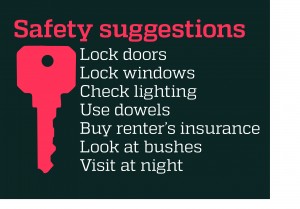
Nate Burstedt walked into his apartment living room at 3 a.m. and found a stranger standing in the corner.
“It’s like you think you’re alone, and you’re not,” Burstedt said.
Burstedt, a senior majoring in physiology, asked the stranger who he was and why he was in the apartment. The stranger said his name was John Taylor and that he was there to pull a prank on one of the roommates.
The explanation failed to convince Burstedt, so he pressed the intruder for the name of the roommate, but the man had no answer. The intruder asked to leave, and Burstedt let him because he saw the man wasn’t carrying any valuables from the apartment.
Unfortunately, there was a backpack by the door that Burstedt failed to see. The man grabbed the bag, which contained Burstedt’s MacBook Air, on the way out.
“I ran over to my own backpack really quick and looked and saw that my computer was gone,” Burstedt said. “I opened the door and ran out, and he was gone.”
After the incident, Burstedt and his roommates searched for how the man could have found his way into the apartment. They had bolted the door shut the night before, and they regularly kept their windows locked.
“We’re pretty sure he came in through our window, which was locked, but it was one of those cheap locks,” Burstedt said.
Off-Campus Housing official employee Pat Newman said it’s important for apartment tenants to make sure their windows are locked securely. She said if tenants are unsure about their window locks, they can stick a dowel in the runner of the window to limit how far the window can open. A dowel is a rod made of wood, metal or plastic. A PVC pipe also works.
Newman said there are steps tenants can take to improve their apartment safety.
The first step is to lock the apartment door.
Newman and Alan Sangster, also an off-campus housing official, acknowledged that not all tenants lock their doors, but they said it only takes one opportunistic person to open an unlocked door and take something.
“Typically it’s not some sort of malicious dude with a black mask over his face breaking into your apartment to steal all your stuff,” Sangster said. “Usually it’s someone opportunistically opening your door and grabbing something that’s by the door.”
Newman and Sangster said tenants who worry about how often their roommates leave the doors unlocked should meet with their roommates and voice their concerns.
“Have a roommate counsel. Sit down with everybody and say, ‘These are the concerns that I have,'” Newman said.
The second step is to buy renters insurance.
“If your stuff is stolen, you want to be able to have some sort of insurance,” Newman said. “You wouldn’t drive your car around without insurance.”
Most tenants in BYU-contracted housing don’t buy renters insurance because of the cost according to Sangster. He said students don’t think it’s worth the purchase because they don’t see immediate use.
Burstedt considered getting renters insurance after his apartment break-in. He found that it would cost him between $10 and $15 per month. He said renters insurance wasn’t worth the cost to him now, but might consider it later.
“Considering I only pay $300 in rent, it seems so expensive to add onto it. If I ever move into a more expensive apartment, I’m going to get it,” Burstedt said.
The third step is to visit the apartment building at night before signing a contract.
“Go to the complex when it’s evening, and see how you feel,” Newman said. “Honestly, a lot of it comes down to how you feel.”
Newman suggested students look for any untrimmed bushes that a person could hide behind. She also said they should determine whether they are satisfied with the lighting outside the complex.
Students who have insecurities or suspicions about where they live should talk to their landlords and then to the Off-Campus Housing Office if there are still problems, according to Newman.
The Off-Campus Housing Office also has a handbook that specifies what BYU requires of contracted housing. Apartments must have some way to see outside their front doors, for instance, and the front doors must have either dead bolt locks or deadlocking latches.
Students with questions about handbook interpretations should call the Off-Campus Housing Office.
Burstedt said he never felt that his apartment was particularly “unsafe.” He said the break-in was just a matter of “bad luck.”




